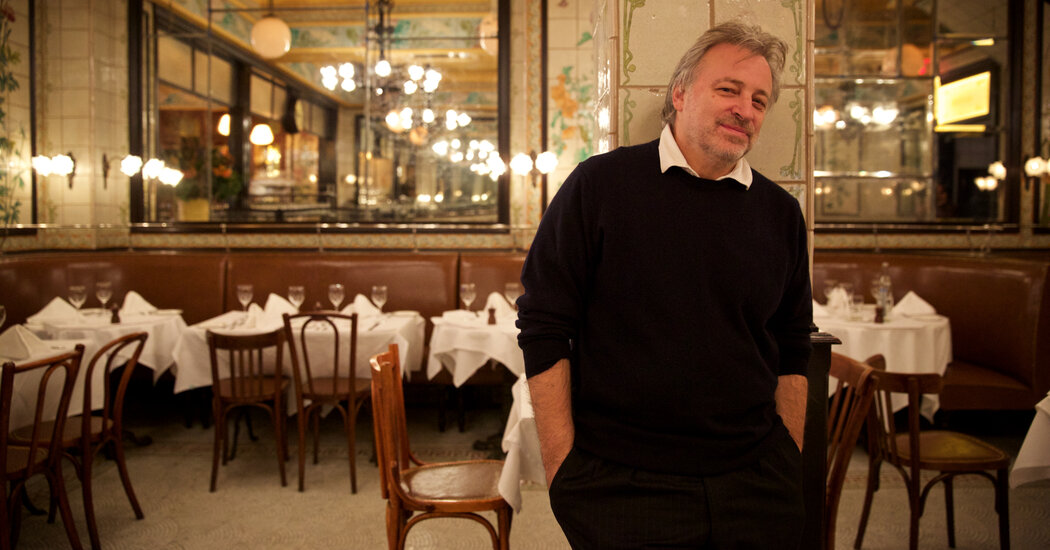I REGRET ALMOST EVERYTHING, by Keith McNally
The restaurateur Keith McNally’s memoir, “I Regret Almost Everything,” is driven by his dislikes, as so many good books are. He loathes two of the first three words in the sentence above, for example. As he puts it in his perceptive and sharply entertaining book, “Not only am I saddled with a first name I can’t stand, I chose a profession with a name I dislike even more: restaurateur. Does a plumber call himself a plombier? Trust the French to come up with the most pretentious word in the dictionary. And just to make it extra difficult for us to pronounce, the bastards went and took the n out of the word.”
He hates bad lighting and arrogant maître d’s. Menus written entirely in French.Tables at which you are too far from your partner. Mastadonic wine lists. Most restaurants with no burger on the menu. Waiters who don’t announce the prices of the specials. Most dinner parties. (“There are few feelings of relief that compare to the first gulp of night air after leaving a dinner party prematurely.”) Peeing at a urinal with another man standing next to him. Elite food-world snobbery against big, bustling restaurants. Fickle landlords. Cat Stevens. Restaurants that close before midnight. The sanctimonious James Beard Awards — he threw his medal in the trash.
There’s plenty more, of course. Lingering too long in museums. Walls without art and rooms without books. Weddings.Rock concerts. Standing ovations. Clichés. Siblings, most of the time. (“It’s not only your mum and dad” who mess you up, he writes.) Sex with women who arrive with big suitcases. Direct sunlight — except when he’s sitting in the shade. Magnificent views. Halloween. New Year’s Eve. “Don Quixote.” Patti Smith (because she reduced a waitress to tears) and Drew Nieporent (because he is Drew Nieporent). Men who lie and say the days their children were born were the best of their lives.Instagram, even though he’s great on it. The successes of his rivals. The stroke that tore his life in two in 2016. Suffering — because it doesn’t make you stronger, “it makes you mean and petty.” Himself.
Beneath the surface chop, and the bohemian restaurant detritus, a story gets told. “I Regret Almost Everything” is about a working-class kid — his father was a stevedore— who grew up poor in the East End of London. McNally skipped college and drifted into acting. The theater director Jonathan Miller and the playwright Alan Bennett (with whom he had a sexual relationship) took him under their wings. They imparted to him an interest in culture and restaurants and design. For 50 years, he writes, he’s been chasing for his restaurants a certain deep mustard color he first saw on Bennett’s apartment walls.
When he tired of acting (he hates acting), he hit the hippie trail, hitchhiking and taking buses through India and Nepal. His shoulder-length hair and placid good looks — McNally still resembles both a Roman bust and an ’80s-era French leading man — did nothing to dampen his warm receptions. He arrived in New York in 1975, vaguely intending to make films, but he ended up, as most aspiring artists in this city do, working in restaurants.
He cut his teeth at One Fifth, now defunct, where he moved from oyster shucker to waiter to maître d’ to general manager. The restaurant was sophisticated, and it was a scene; McNally befriended Lorne Michaels, who’d bring the “Saturday Night Live” cast there. He met his first wife and future business partner, Lynn Wagenknecht, at One Fifth. He also befriended the young Anna Wintour, who changed his life by inviting him to Paris and touring him through that city’s best bistros and brasseries.
He returned to New York determined to open his own version of a Parisian brasserie. He did so and more, redefining this city’s restaurant ethos as he moved along. Most were in gritty downtown neighborhoods. The Odeon, in Tribeca, opened in 1980. The then unknown Jay McInerney offered to pay McNally for the use of the restaurant’s signage, with the Twin Towers looming off to one side, on the cover of his novel “Bright Lights, Big City” (1984). McNally didn’t think the book would sell, so he let him use it for free.
